On the top of a hill, where time seems to have stood still, stands the Castle of Sant Julià de Ramis, a vestige of the past that is now being reborn with Esperit Roca, an ambitious project by the Roca brothers. It includes a hotel, a wine cellar with more than 80,000 bottles, a fine dining restaurant, a distillery, a glass recycling centre and an exhibition space. All this allows them to narrate the creative universe of their 38 years of history. In addition, they have just been awarded the Demeter certificate, the most demanding in terms of standards and cultivation systems.
We talked to Joan Roca about the project’s commitment to sustainability, the ‘second recipe’ initiative, the Esperit Roca ecosystem, future projects and his more intimate side.
The Roca Brothers’ sustainability projects
How does Esperit Roca contribute to sustainability and respect for the environment?
Esperit Roca is a project that is architecturally very integrated into the landscape of this mountain, the Muntanya dels Sants Metges, but above all it is involved in sustainability. Here we are going to locate Roca Recicla, a glass, polystyrene and plastic recycling centre.
In the new restaurant they develop a cuisine inspired by the iconic dishes of Celler de Can Roca 38 years ago, using local and seasonal products. All of them come from small producers, farmers and fishermen. Each season marks which dishes we are going to recover from our gastronomic history.
If all Michelin Stars were awarded first based on sustainability criteria, do you think this would have a significant impact on world gastronomy?
I think it should be the Green Michelin Stars before the others. If we are not sustainable, we should not have a restaurant. Therefore, paying attention to sustainability from each house, each in its own measure, is important.
That’s why it would be good if Michelin would consider, before giving stars for culinary excellence, giving them for those Green Michelin Stars that have to do with respect for the environment and sustainability.
‘Sustainability should be the first criterion for awarding Michelin stars. I think the Green Michelin Star is fundamental and should be prioritised over culinary excellence’.
What actions are you taking to prevent food waste?
We have launched an initiative called ‘second recipe’ with the aim of reducing food waste. El Celler de Can Roca’s recipes have a culinary process that is often designed to develop a dish that has been worked on in our master’s department. Now these recipes are accompanied by a ‘second recipe’ which is the one we make with the parts of the product that we are not going to use for the first recipe; in this way we ensure that we generate the minimum amount of food waste.
30% of food production ends up as food waste. Food production is one of the main causes of CO2 emissions, so if we reduce production and focus on what we need, we will reduce emissions.
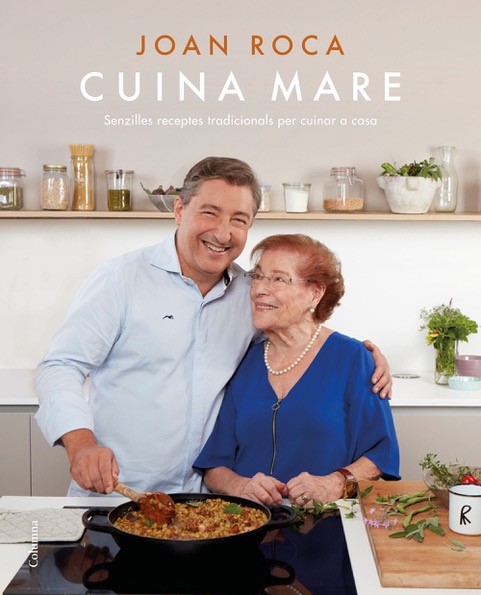
Book of recipes for cooking at home.
People cook little at home and use little fresh produce, so this is one of the big issues we would like to address. We do this by publishing recipe books to encourage home cooking, the reduction of food waste and conscious consumption.
Why did you decide to participate in the ‘Sustainable Gastronomy’ project in collaboration with BBVA?
BBVA is a strategic partner for us that has allowed us to develop various projects, travel and gain knowledge of other culinary cultures. Recently we have been working with small producers, giving awards to those who work with a sustainable approach to their crops. We use their products, integrate them into our recipes and contribute to promoting the work of these producers. We want to raise awareness about the importance of consuming local and quality products.
Tradition and innovation in their gastronomy
Talking about the sustainable gastronomy project, how do you manage to balance tradition and innovation in gastronomy?
Innovation and tradition go hand in hand since Celler de Can Roca started in August 1986 because we understand that we cannot innovate without knowledge. In knowledge is tradition, being aware of where you are, where you come from, what has been eaten in the place where you are cooking before.
‘Recently we have been working with small producers, giving awards to those who work with a sustainable approach to their crops’.
Science, creativity and innovation make this tradition evolve, opening new windows from a technical and conceptual point of view. Perhaps the cuisine of El Celler de Can Roca is an example of this evolution, of how we, coming from a traditional Catalan cuisine restaurant like Can Roca, have evolved to what is today a restaurant open to the world, committed to creativity, innovation and above all to local products.
Could you give us an example of an evolutionary dish from Celler de Can Roca?
There is a traditional dish from Gironès inspired by the sea and mountains that instead of combining ingredients such as chicken with lobster or rabbit with crayfish, opts for something simpler and more essential: an oyster bathed in a distillate from the land. This distillate was obtained with rotavapor, an apparatus that allows water to be distilled at a low temperature with earth from the holm oak forests near Girona.
In essence, it was a very radical sea and mountain distillate, but very interesting because it was the sublimation of a traditional idea, but with the same intention and synthesis.
We have been pioneers in the incorporation of avant-garde technology in the kitchen. Twenty years ago we were beginning to feel attracted by the constant search for techniques and new ways of treating products. For example, we made an essential oil from sheep’s wool to accompany a textured sheep’s milk dessert made by Jordi.
Recovery of botanical species at Mas Marroc
What botanical species have you recovered or promoted during this time?
We started a project called “Sowing the Future”, located at Mas Marroc, our agricultural estate, where we have 5 hectares of crops and we plant and recover seeds to be able to use them in our kitchen. Some of these products are black potatoes, Girona bug, “de l’ull ros” beans and some varieties of tomatoes that were no longer cultivated.
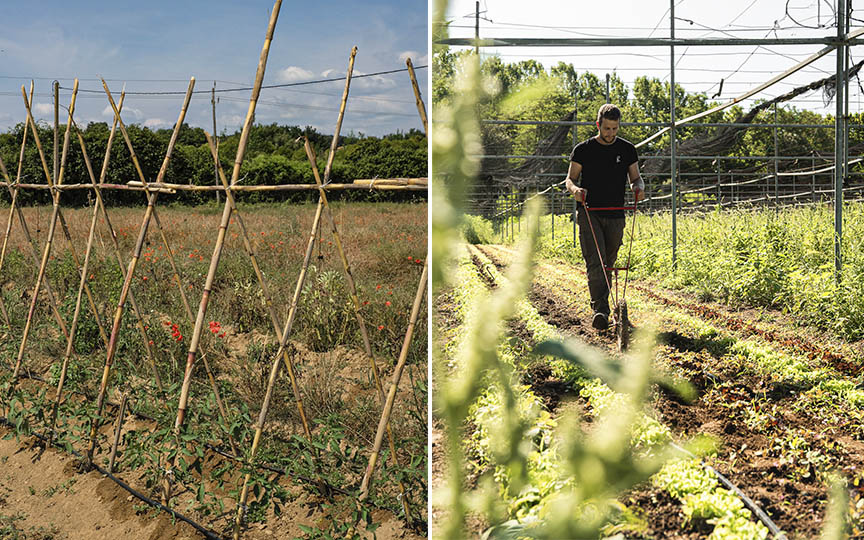
Garden in Mas Marroc where seeds are recovered to obtain products that were no longer cultivated.
We also realized that there was a problem of loss of agricultural biodiversity, because crops are increasingly concentrated in very specific varieties that have a higher yield. As activists, we want to recover these seeds and then share them with farmers in the area.
“Twenty years ago, we began to feel attracted by the constant search for techniques and new ways of treating products.”
How do you apply social sustainability to the human factor in your restaurants?
In a restaurant of these characteristics or a company dedicated to services and serving customers, we think it is very important to also take care of those we call internal customers so that this chain works correctly.
We think that the idea of taking care of people is very important in a work environment where what we seek above all is to transmit happiness to our customers. For this to happen, we have to take care of the happiness of our teams.
About the Esperit Roca ecosystem
El Celler de Can Roca has transcended haute cuisine and has delved into various projects that explore gastronomy and culture in a broader way.
Esperit Roca Distillery was the first project that came to this mountain of Sants Metges, since we needed a space to distill and produce spirits, liqueurs, vermouth, beers and fruit wines. Many of them are made with herbs from this mountain. It is a way of capturing the landscape that surrounds us through the alchemy of distillation.
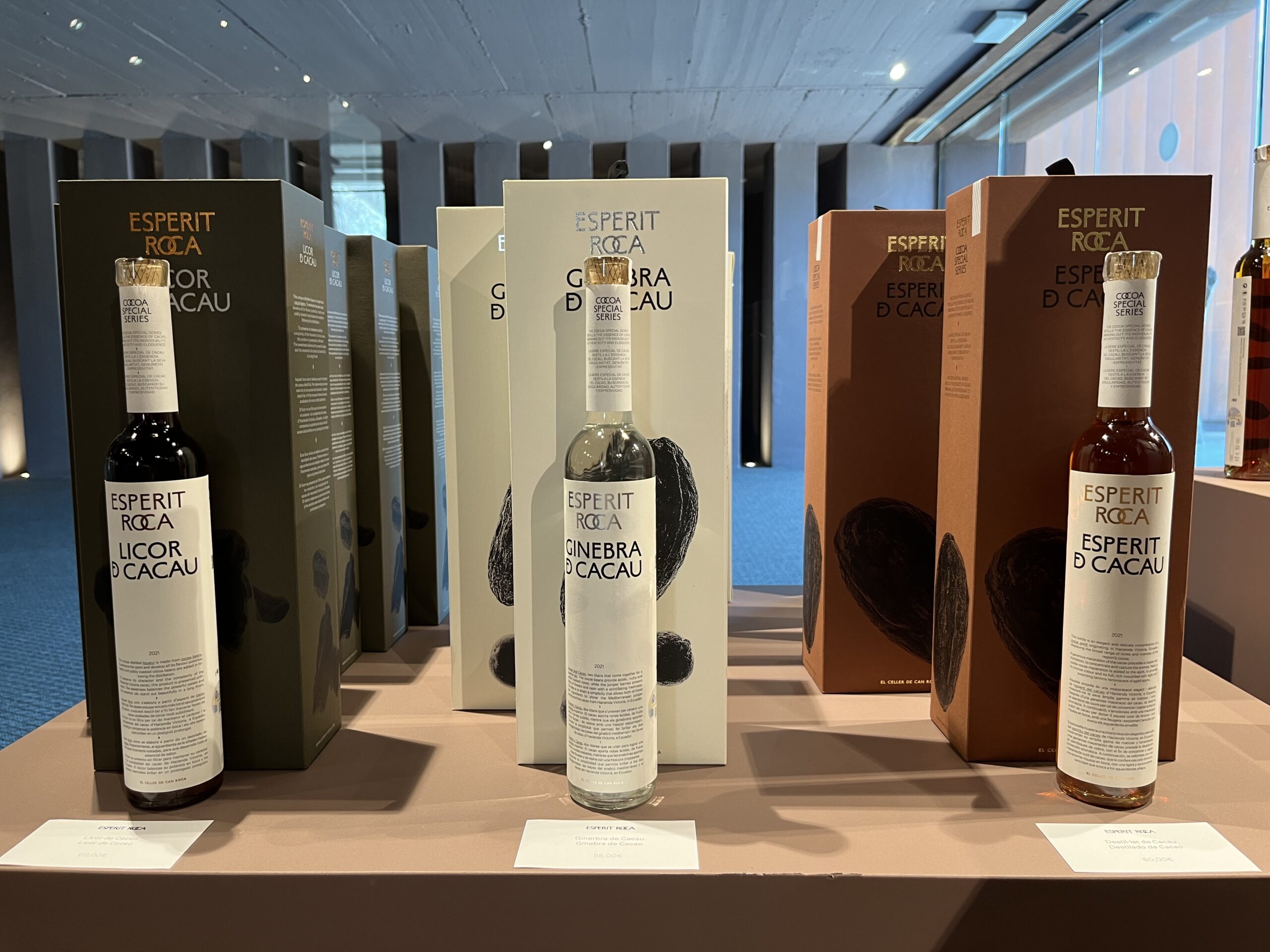
Products from the Esperit Roca store.
The Esperit Roca Winery houses a collection of more than 80,000 bottles of wine, from classics to smaller, artisanal productions. With this, sommelier Josep Roca makes it one of the restaurants with the largest wine cellar in the world. It is located in a silver dome where natural light penetrates through a central hole creating a play of light and shadow. Classical music plays in the air. In the future, they plan to organize wine tastings.
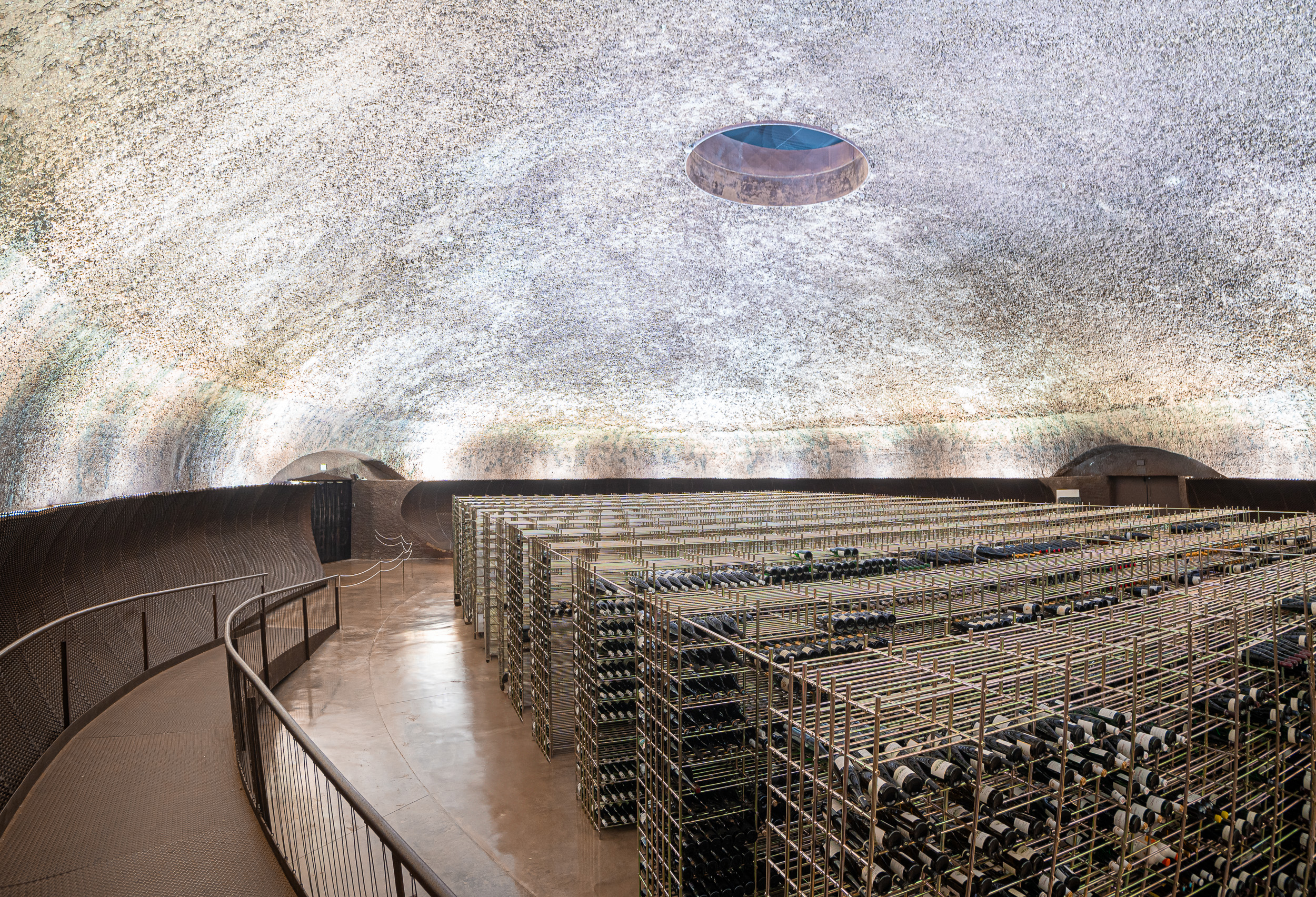
Esperit Roca Winery.
The Esperit Roca Restaurant offers a more informal, but equally innovative, gastronomic experience based on the reinterpretation of iconic dishes from Celler de Can Roca with two tasting menus. The Salty Spirit Menu has 6 savoury dishes and 2 desserts (€170), and the Sweet Spirit Menu puts the spotlight on desserts with a proposal of 2 savoury dishes and 6 desserts (€139). There is also an a la carte option.
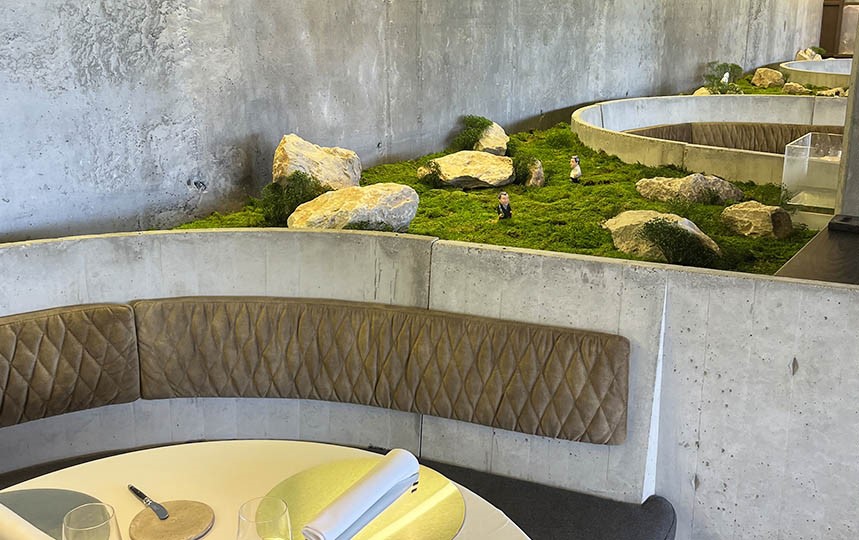
Esperit Roca restaurant.
Finally, the CCR Space (Cooking-Consciousness and Reflection) is the title of a book they have recently published, which explains the last ten years of cooking at El Celler de Can Roca. In it, they explain their commitment to creativity and innovation, but also to society by sharing projects on austerity and recycling.
Future projects of the Roca brothers
Do you have plans to expand your culinary influence to other countries?
We have always said no and have rejected many proposals that have come to us to open El Celler de Can Roca in the big cities of the world, thinking that we should be here, in Girona. It is where we feel comfortable cooking, with local products, our cuisine and in our city.
However, this year The Macallan celebrates 200 years and they have proposed to us to open a restaurant in their distillery. It will be called Time Spirit Macallan El Celler de Can Roca.
For us The Macallan is like a nearby paradise, a place we go to very often because we have worked on many projects with them. We have not been able to say no, but we are also convinced that it is a project that makes a lot of sense for us. Thanks to it we have been able to travel all over Scotland, get to know the territory and its products, we have published a book – Distilling Scotland – and created a documentary about Scottish gastronomy.
Tell us about the Roca Academy project.
Roca Academy will be the last phase of the project. We are just starting to work on it and we don’t know the deadlines yet, but the idea is to create a master’s degree and specific courses on specific techniques. We have been working with training for 20 years and we thought it would be nice to share our knowledge in this space.
You plan to celebrate the Roca Adwards, which will promote the richness of our cuisine through literature. Can you tell us about this future project?
Roca Adwards is a project that aims to reward and give visibility to gastronomic literature as it is a very important part of literature and allows the culture of gastronomy to be spread. It has international ambitions.
__
The more personal side…
Do you have any family traditions that you consider very special?
Cooking and eating as a family. We are very fond of celebrations and eating at large tables.
What is the sustainable action that you usually carry out?
I try to be very respectful with recycling at home and apply it to our teams so that we are all respectful of the environment.
What dish do you like to cook the most?
I like rice. Rice is an ingredient that is found in many cultures and is cooked in different ways.
A book.
Chemistry Lessons by Bonnie Garmus, a very interesting book that talks about cooking and science in a very educational way.
A movie.
I just saw Perfect Days and I loved it, but I also recommend Slow Cooker with Juliette Binoche. They are two very different movies and both very good.
A singer.
Bob Dylan.
A series that you would recommend.
The Bear. I am watching the third season and I find it fascinating how the life of a chef is expressed in a series. It reflects the stress, passion, commitment and even psychological complexity of a chef in relation to his work. I think it is a brilliant series.
A country or city that you would always return to.
Mexico. I love Mexico for its gastronomic culture, its diversity, for everything it represents. Culinarily, it is very interesting, and also humanly, because I think that the people are very hospitable and happy. I wouldn’t say just one city because I go to DF a lot for work, but I love being able to travel through all the great diversity that the country has.
Three chefs that you admire for their work.
My mother is a reference, she is a cook who transmitted to us not only the profession but also values. Ferran Adrià, friend and neighbor, while Roses is very close and in some way with him began this revolution of which we have been a part.
René Redzepi, from the Noma restaurant in Copenhagen. I think he is a chef who in recent years has revolutionized the way we look at cooking.
In two years, it will be 40 years since El Celler de Can Roca opened and the celebration will be linked to Esperit Roca. “It will be a nice way to celebrate it,” Joan Roca tells us.




